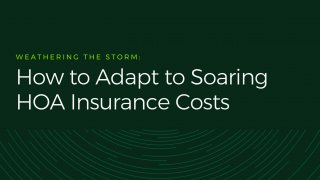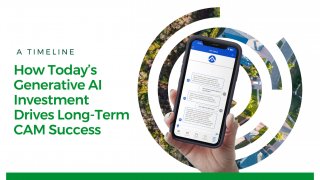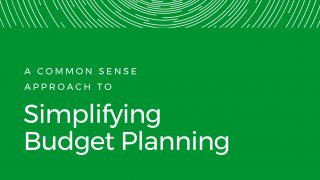- December 6, 2019
- CINC Systems

When you manage a homeowners association (HOA), it’s important to develop best practices for financial reports. Financial reporting is an integral part of your client services. From collecting resident fees to paying bills, and managing the general ledger, association management requires a lot of accounting. By implementing best practices for HOA financial reports, you’ll be able to help your clients run a successful, viable association.
If you’re new to HOA management, or just looking for a refresher, financial reports best practices are the various organizational tools and systems you use to share and analyze accounting data with your clients. Each set of best practices will be different to meet the needs of different clients. However, there are certain universal principles that all association managers should implement for HOA financial reports.
By learning financial reports best practices for HOAs, you can ensure each client’s association is always in prime financial health. The best kind of financial reporting helps clients make sure they’re staying within their budgets, meeting all goal targets for the HOA’s reserve fund, paying vendor invoices on time, and more.
Here are some important best practices for HOA financial reporting:
Learn State and Regional Law
Currently, there are very few federal laws that apply to HOAs. This means that all financial regulations, tax requirements, and civil codes for HOAs are governed at the state and regional level. As one of your best practices for HOA financial reports, make sure you always know the laws that apply to your clients.
Learning state law, as well as the laws for your client’s county and city, will help you determine what kind of guidelines the HOA needs to follow. With regard to finances, state and local legislation may require your clients to use a specific protocol for disclosing assets to the association members. For example, some states may require HOAs to implement an accrual method for financial reporting. There may also be specific deadlines related to taxes, licensing, and permit renewals.
Understand the state and regional laws that apply to your clients’ associations so you can assist them and provide clear, legally approved financial reports.
Set Clear Budgets with Your Client
An HOA financial report provides a valuable assessment of your client’s finances. However, the information contained in a financial report isn’t very useful unless you know what it’s actually measuring. Therefore, one of the most important best practices for HOA financial reporting is setting clear budgets with your client.
As an association manager, you won’t be setting the HOA’s budget yourself. That duty falls to the association’s board members. However, you can act as a consultant to the board, offering your knowledge and experience to help them set annual and monthly budgets. Once the HOA budget is in place, you’ll be able to customize financial reports to reflect different budget categories and goals.
Choose a Cash or Accrual System
Next, choose a cash system or accrual system for the HOA’s accounting. In a cash accounting system, you record your client’s income as they receive it. Similarly, expenses are logged whenever they are paid. This accounting system is fairly straight-forward but may offer limitations to HOAs that have more complicated investments, outstanding debts, and fee structures.
In an accrual system, you record the HOA’s income whether or not the money has been actually received. For example, you’d record fee payments from residents even if the payments are still being processed or outstanding. Similarly, an accrual system dictates that you record all incurred expenses even if they haven’t been paid yet. The books are balanced later.
Each type of system offers different benefits. For some HOAs, cash will be better than accrual. However, no matter which type of system your client implements, make sure you understand the process as it relates to your financial reporting.
Sync All Financial Accounts
When developing best practices for financial reporting for your HOA management business, organization is key. If you’re not organized, the financial data you process for your client can quickly become overwhelming. One of the best ways to keep your client’s financial information organized is to sync all financial accounts in one place.
With CINC Systems association management software, you’ll gain a powerful feature called automatic bank reconciliation. This allows you to integrate your client’s financial accounts into your management dashboard. View account balances, deposits, and withdrawals all in one place, rather than logging into different banking websites each time you need to see the client’s finances. And, the best part, data is updated in real-time.
By syncing your client’s HOA bank accounts, you’ll be able to monitor transactions and develop a detailed analysis of the financial data. This unique insight enables you to create more accurate financial reports. We recommend that all HOA managers implement this as part of their financial reporting best practices.
Use Software to Generate Reports
You can use your HOA accounting software to generate reports. The advanced technology in association management software helps immensely in financial reporting. Software like CINC Systems makes spreadsheets and paper ledgers obsolete. The reports are also more accurate because you’re not doing the calculations manually.
With CINC Systems, you can generate financial reports for your clients automatically. You can highlight specific data sets, such as expense categories or time periods, and then email these financial reports directly as digital files. To see how using CINC Systems association management software can improve your company’s best practices, request a free demo or call (855) 943-8246.
Perform Monthly and Yearly Analysis
Finally, all HOA managers should include regularly scheduled financial analysis as one of their best practices for financial reporting. Set up a time each month to go over your client’s financial reports and present the data to the HOA board. Then, plan a yearly audit to review overall financial health and plan for next year’s budgets.
By using these best practices for financial reports for HOAs, you’ll help your client’s association thrive. HOA accounting isn’t always the most exciting part of your job, but with best practices, it can be the most rewarding.
Related Reads

Blog
Keeping Calm and Carrying On: Leadership Tips for Turbulent Times
- November 20, 2024

Blog
AI at Bat: What Umpires, Baseball, and Data Security Can Teach Us About AI Risks
- October 28, 2024

Blog
Do I really need a homeowner app when I have a mobile-friendly website?
- October 14, 2024

Blog
Weathering the Storm: How to Adapt to Soaring HOA Insurance Costs
- October 1, 2024

Blog
How Today’s Generative AI Investment Drives Long-Term CAM Success: A Timeline
- September 16, 2024

Blog
A Common Sense Approach to Simplifying Budget Planning Get ready to conquer HOA budget season with this effective strategy
- September 2, 2024
